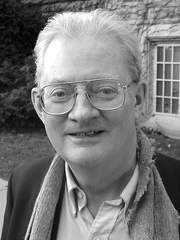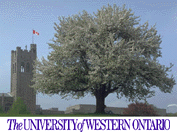HOME
DISINFORMATION
PEOPLE
HILBORN
HUNTER
LEISHMAN
MORGAN
PRESS
CHRC
Kenneth Hilborn
Western News
23-Jan-2003
Academic Freedom and Canadian Law
|

Kenneth Hilborn
|
"Truth or lack of it is simply irrelevant. Thus, if it makes points distasteful to a particular group,
even a scrupulously documented scholarly work may provoke a legally valid
complaint." — Kenneth Hilborn
The original of the Kenneth Hilborn letter to the editor of the Western News can be found online at:
www.safs.ca/april2003/canadianlaw.html
The University of Western Ontario home page can be accessed by clicking its logo on the left above, and the Western News Online home page can be accessed by clicking its logo below.

ACADEMIC
FREEDOM AND CANADIAN LAW
Kenneth H.W. Hilborn
University of Western
Ontario
In a nation at war or under
apparently imminent threat of attack — especially attack by fanatical foes
believed to have infiltrated its own society — the freedoms that individuals
enjoy in normal circumstances must inevitably be curtailed to some extent.
Believers in liberty should insist, however, that all resulting restrictions on individual freedom
should be demonstrably necessary, or at least clearly relevant to the purpose
of enhancing national security and frustrating the enemy. Otherwise security
may become a mere pretext for expanding the powers of the state at the
expense of the public.
In the aftermath of the terrorist
crimes of September 2001, the government in Ottawa extended the scope of
Section 13(1) in the Canadian Human Rights Act — originally applicable
only to telephonic communications — to make it apply also to the Internet.
Section 13(1) permits legal
action against persons whose statements are allegedly "likely" to expose
racial, religious and various other identifiable groups to "hatred or contempt."
In his book The New Anti-Liberals, published in 1999 by the Canadian
Scholars' Press, A. Alan Borovoy — for many years the general counsel of
the Canadian Civil Liberties Association — expressed alarm about the "sheer
breadth of the prohibition against speech" even in the statute as it then
existed.
Without gaining any real
advantage in the struggle against terrorism, the government's action has
potentially ominous implications for academic freedom — the
Internet having become a significant means of scholarly
communication — as well as for freedom of expression in
Canadian society at large.
As Borovoy points out, the
Act does not recognize any defence based on "truth or reasonable belief
in the truth of the statements at issue." Truth or lack of it is simply
irrelevant. Thus, if it makes points distasteful to a particular group,
even a scrupulously documented scholarly work may provoke a legally valid
complaint.
There is also no need for
an accuser to provide evidence that the accused had any intention or desire
to promote "hatred or contempt." Like truth, intention is irrelevant.
To make matters worse, an
accuser is not required to show that the words of the accused really did
promote "hatred or contempt," but merely that they were "likely" to do
so. An assessment of the "likely" consequences of anything is bound to
be more subjective than a judgment based on ascertainable facts about what
has actually occurred.
Moreover, since the prohibitions
included in the Human Rights Act are not part of the criminal law, an accused
can be subjected to penalties without either trial by jury or a requirement
that guilt be proved beyond a reasonable doubt.
Borovoy warns that even if
such repressive legislation is not often used, the threat of legal sanctions
may well be enough by itself to inhibit the expression of controversial
views, including "important political, historical, and social commentary."
For example, an historian's account of atrocities committed by a group
in the past, or a sociologist's discussion of a group's exceptionally high
rates of crime, alcoholism, or out-of-wedlock births, could be said to
expose the group in question to "hatred or contempt."
In Canada, unlike the United
States, the judiciary cannot be counted upon to overturn legislative attacks
on freedom of expression as unconstitutional. To protect individual liberty,
the law should be drastically revised.
Published in Western News,
January 23, 2003.
Ken Hilborn, Professor
Emeritus of History, is a SAFS member and a former member of the Board
of Directors.
HOME
DISINFORMATION
PEOPLE
HILBORN
HUNTER
LEISHMAN
MORGAN
PRESS
CHRC



